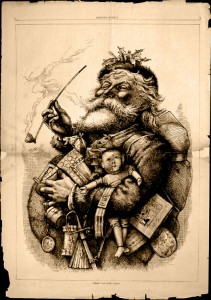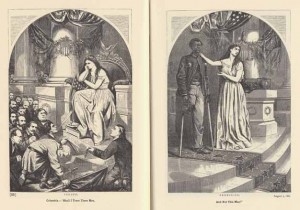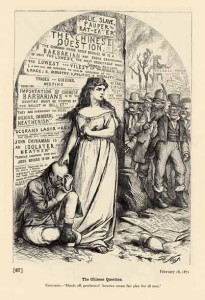Wake voters up with a 4am robocall purporting to be your political opponents and you could go to jail for 3-5 years if legislation proposed by Assemblyman Declan O’Scanlon becomes law.

Assemblyman Declan O’Scanlon
O’Scanlon and his colleague, Assemblyman Scott Rumana of Wayne, have proposed amending the “Fair Campaign Practices Act,” to provide that no person can direct, order or assist another person to produce, transmit or disseminate any communication that purports to originate from the campaign of a candidate for public office but is actually for the purpose of impeding the campaign of that candidate. Such activity would become a third degree crime which calls for a 3 to 5 year prison term and a fine of up to $15,000.
Read the rest of this entry »
Posted: June 27th, 2013 | Author: Art Gallagher | Filed under: Uncategorized | Tags: 4am robocall, Bayshore Tea Party Group, Bob Gordon, Declan O'Scanlon, Dirty Trick, Dwayne Horner, Leigh-Ann Bellew, Scott Rumana, Wake up call | 9 Comments »
The Question is: Why?
By Carolee Adams, President, Eagle Forum of New Jersey
In 2001, former NJ State Assemblyman Scott Garrett (now Congressman R-5) and State Senator Gerald Cardinale (R-39) worked with Eagle Forum of New Jersey, Ridgewood parents, and others to stop nosy, intrusive student surveying of their children without “written, informed, parental consent”. That meant a parent had to, not only be “notified” of such surveys that could be administered to their children, but to be able to review that survey in advance and signify, in writing, with their signature, if they approved or not. It’s as simple as that – akin to a parent giving written consent for a school trip after being satisfactorily advised about the complete details of that trip.
However, over and over again since the 2002-3 legislative session, state legislators have sought to remove “written, informed, parental consent” from the exceptional language used in the 2001 Bill reverting back to only “notification”. “Notification” only used pre-2001 was the reason why “written, informed, parental consent“ was sought! Ridgewood parents claimed they never received “notification”; would never have signed off on such a survey had they been able to review it; and they justifiably sued – twice – and won based upon violations of a student’s rights under the Fourth, Fifth, and even Fourteenth Amendments.
In testimony, among many other factors presented in writing, I reminded Assembly Education committee members of those historic suits, and how costly to local Boards of Education and the State should a parent claim s/he did not receive notification and, consequently, did not grant express written permission. Even though one Assemblyman claimed how he wanted more “proactive” parental involvement, all but one Committee member was, obviously, foolishly satisfied or unconcerned with the sponsors’ assurance of “notification” only.
Further, and not publicly aired, in private conversation with one Republican Assembly member of the committee, an aid commented to me that Municipal Alliances favored the Bill; they needed money for their drug/alcohol abuse programs, etc. When I responded: “Do you mean you would disrespect parental rights and sacrifice a student’s privacy for money,” she and her Assembly member walked away from me prior to a vote of “yes” to approve the Bill and move it out of Committee. Only Assemblyman Scott Rumana voted “No”.
Read the rest of this entry »
Posted: February 17th, 2013 | Author: admin | Filed under: NJ State Legislature, Parents, Parents Rights | Tags: A2421, A2421/S454, Assembly Education Committee, Carolee Adams, Gerald Cardinale, Municipal Alliances, S454, Scott Garrett, Scott Rumana, Sociologial strip search, Student surveys | 1 Comment »
So should the Assemblymen who are opposed to his nomination
Thomas Nast, the 19th century political cartoonist who gave Harper’s Weekly enough political influence to topple Boss Tweed and Tammany Hall and to sway the election of two presidents, Grant and Cleveland, has been nominated for the New Jersey Hall of Fame’s class of 2012.
 Nast, who popularized the image of Santa Claus and the partisan symbols of Donkeys and Elephants for Democrats and Republicans had an undeniable and enduring impact on American culture.
Nast, who popularized the image of Santa Claus and the partisan symbols of Donkeys and Elephants for Democrats and Republicans had an undeniable and enduring impact on American culture.
Nast lived in Morristown for over 20 years, starting in 1872.
His nomination to the NJ Hall of Fame has generated controversy from the Irish Catholic community who contend the artist was a anti-Irish/anti-Catholic bigot because he frequently depicted the Irish as drunken apes and Catholic bishops as crocodiles. Neil Cosgrove of New City, NY wrote in a Letter to the Editor in The Star Ledger that Nast is “the father of hateful and negative anti-Irish stereotypes that Irish-Americans continue to struggle against today.”
This Irish-American Catholic hasn’t struggled against stereotypes today, or any other day that I can remember.
Three New Jersey Assemblymen have jumped on the anti-Nast bandwagon. NorthJersey.com reports that Wayne DeAngelo (D-Mercer) and Dave Rible (R-Monmouth) have called on the NJ Hall of Fame to withdraw the nomination. Scott Rumana (R-Passaic) issued a press release echoing DeAngelo.

Pardon. Franchise. Columbia.-"Shall I trust these men, and not this man?" ~ Harper's Weekly, August 5, 1865
The Assemblymen and the Ancient Order of Hibernians have it wrong. Nast was not a bigot. Far from it. His political art, starting during the Civil War and through Reconstruction was fervently pro-equality for Blacks and other minorities.

'"The Chinese Question.' Columbia- "Hands off, gentleman! American means fair play for all men."' ~ Harpers Weekly, February 18, 1871
Nast’s anti-Irish and anti-Catholic cartoons were political, not ethnic or religious.
Morton Keller, Professor of History at Brandies University addressed Nast’s anti-Irish, anti-Catholic work on the centennial of the cartoonist death:
It may be asked why Nast’s sympathy for blacks, Indians, and Chinese did not extend to the Irish and Catholicism. Mid-nineteenth century liberals—and Nast certainly was one of them—regarded the Catholic church as the fount of anti-modernism and fanaticism. (See fig. 16.) This attitude was reinforced by the commitment of many Irish-Americans to the Democratic party, hostility to abolition, and Negrophobia. The intertwining of his hostility to the Church, the Irish, and the Tweed Ring suggest that for him this was another chapter in the ongoing struggle to preserve the American Union, and Lincoln’s new birth of freedom, from its enemies. In this sense the Confederates, the anti-Reconstruction, pro-Johnson Democrats, and the Tweed Ring and the Catholic church were parts of a collective whole. It stirred in Nast the peak of his distinctive mix of artistic inventiveness and political passion. (See figs. 17, 18, 19, 20, 21, and 22.)
These drawings spoke to the political and social concerns of the core urban constituency of wartime and postwar Republicanism: Protestant farmers, professional and businessmen, shopkeepers, artisans.
This is Nast’s third year as a nominee for the New Jersey Hall of Fame. He’s up against tough competition in the “General” category. If not for the controversy, I would have chosen between Milton Friedman, Joyce Carol Oates or Governor Tom Kean.
But I voted for Nast and hope you do too. My fellow Irishmen from the Ancient Order of Hibernians should have researched Nast before making a PC stink and acting like Tommy DeSeno with his rants about how Italian-Americans are depicted in the movies. If the controversy the Hibernians created over Nast puts him over the top of the voting and into The Hall, it will be just comeuppance.
Vote here.
Posted: December 13th, 2011 | Author: Art Gallagher | Filed under: Uncategorized | Tags: Ancient Order of Hibernians, Dave Rible, Governor Tom Kean, Joyce Carol Oates, Milton Friedman, Morton Keller, New Jersey Hall of Fame, Scott Rumana, Thomas Nast, Tommy DeSeno, Wayne DeAngelo | 7 Comments »


 Nast, who popularized the image of Santa Claus and the partisan symbols of Donkeys and Elephants for Democrats and Republicans had an undeniable and enduring impact on American culture.
Nast, who popularized the image of Santa Claus and the partisan symbols of Donkeys and Elephants for Democrats and Republicans had an undeniable and enduring impact on American culture.
